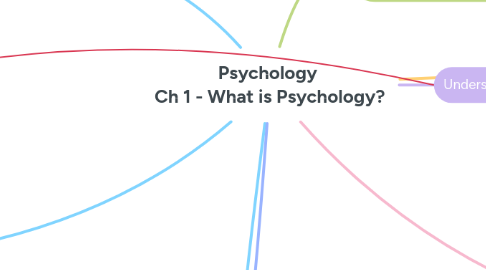Psychology Ch 1 - What is Psychology?
by parameshwari kolhe

1. A Disciple
2. Mind cannot exist without brain. But mind is a separate entity. ◾ According to a recent study, there is a relationship between mind and behaviour.
3. 2) Functionalist method By William James (American psychologist)
4. 3) Gestalt psychology (20th century)
5. 4) Behaviorism(1910) by John Watson.
6. 5) Psychoanalysis (Sigmund Freud)
7. 1879- William Wundt established 1st experimental laboratory in Leipzig Germany 1) Introspection method
8. 7) Cognitive perspective (Structuralism + Gestalt)
9. as Social science ◾ Focus- on how behavioural phenomena can be explained in terms of interaction between a person and its socio-cultural context. Humans as social beings ◾ Each behavioural phenomena has multiple causes.
10. Physical and biological sciences ◾ Assume - behavioural phenomena have many causes. ◾ Focus- on biological principles to explain human behaviours. ◾Aim- know the cause- effect relationship and predict it.
11. Natural science ◾ Considers biological and physical factors around humans.
12. Evolution of psychology
12.1. 6)Humanistic perspective Carl Rogers and Abraham Maslow
13. Psychology and other disciplines Philosophy Medicine Economics, political science and sociology Computer science Law and criminology Mass communication Fine Arts and music Architecture and engineering
13.1. Psychologists at work Clinical psychology Counseling Community School and Organisational psychology.
14. Mental processes ◾Use of mental processes - think, remember, solve problems, make decisions etc. ◾ Reflected through brain activities (neural activities). ◾ Mental processes and brain activities are interdependent and mutually overlapping.
15. Behaviours ◾Response to a particular stimulus or activity. ◾Can be short or enduring or simple or complex. ◾Covert behaviour- Behaviour which cannot be seen and sensed from outside. Internal ◾Overt behaviour- Behaviour which can be seen and sensed from outside. External
16. Psychology is a science which studies mental processes, behaviours and experiences in different contexts.
17. Experiences ◾ Subjective and individualistic ◾ Influenced by Internal and External factors
18. Popular notions about Psychology
19. ◾Scientific knowledge of psychology often runs against common sense Scientific × Common sense knowledge ◾ Common sense - based on Hindsight ◾ Psychology as a science looks for- Patterns of behaviour which can be predicted, not explained after the behaviour occur.
20. Branches of psychology Cognitive psychology Biological Psychology Developmental psychology Social psychology Cross cultural and cultural psychology Environmental Health Clinical Counseling Industrial/organizational Educational Sports
21. Themes of psychology 1) psychology like other sciences attempts to develop principles of behaviour and mental processes. 2) Human behaviour is a function of the attributes of persons and environment. 3) Human behaviour is caused. 4) Understanding of human behaviour is culturally constructed. 5) Human behaviour can be controlled and modified through the use of psychological principles.
22. Understanding Mind and Behaviour


